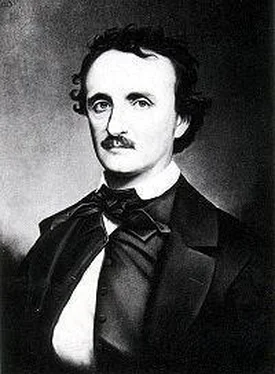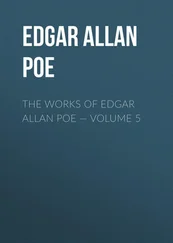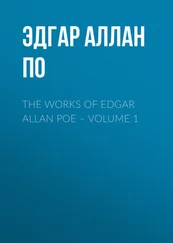Эдгар По - Works of Edgar Allan Poe
Здесь есть возможность читать онлайн «Эдгар По - Works of Edgar Allan Poe» весь текст электронной книги совершенно бесплатно (целиком полную версию без сокращений). В некоторых случаях можно слушать аудио, скачать через торрент в формате fb2 и присутствует краткое содержание. Жанр: Старинная литература, на английском языке. Описание произведения, (предисловие) а так же отзывы посетителей доступны на портале библиотеки ЛибКат.
- Название:Works of Edgar Allan Poe
- Автор:
- Жанр:
- Год:неизвестен
- ISBN:нет данных
- Рейтинг книги:4 / 5. Голосов: 1
-
Избранное:Добавить в избранное
- Отзывы:
-
Ваша оценка:
- 80
- 1
- 2
- 3
- 4
- 5
Works of Edgar Allan Poe: краткое содержание, описание и аннотация
Предлагаем к чтению аннотацию, описание, краткое содержание или предисловие (зависит от того, что написал сам автор книги «Works of Edgar Allan Poe»). Если вы не нашли необходимую информацию о книге — напишите в комментариях, мы постараемся отыскать её.
Works of Edgar Allan Poe — читать онлайн бесплатно полную книгу (весь текст) целиком
Ниже представлен текст книги, разбитый по страницам. Система сохранения места последней прочитанной страницы, позволяет с удобством читать онлайн бесплатно книгу «Works of Edgar Allan Poe», без необходимости каждый раз заново искать на чём Вы остановились. Поставьте закладку, и сможете в любой момент перейти на страницу, на которой закончили чтение.
Интервал:
Закладка:
"Bogs, Hogs Logs, Frogs & Co.,
"No. 110 Dog Street"
By the thirty-first day of the month, this advertisement has brought to the office of Messrs. Bogs, Hogs, Logs, Frogs, and Company, some fifteen or twenty young gentlemen piously inclined. But our man of business is in no hurry to conclude a contract with any -- no man of business is ever precipitate -- and it is not until the most rigid catechism in respect to the piety of each young gentleman's inclination, that his services are engaged and his fifty dollars receipted for, just by way of proper precaution, on the part of the respectable firm of Bogs, Hogs, Logs, Frogs, and Company. On the morning of the first day of the next month, the landlady does not present her bill, according to promise -- a piece of neglect for which the comfortable head of the house ending in ogs would no doubt have chided her severely, could he have been prevailed upon to remain in town a day or two for that purpose.
As it is, the constables have had a sad time of it, running hither and thither, and all they can do is to declare the man of business most emphatically, a "hen knee high" -- by which some persons imagine them to imply that, in fact, he is n. e. i. -- by which again the very classical phrase non est inventus, is supposed to be understood. In the meantime the young gentlemen, one and all, are somewhat less piously inclined than before, while the landlady purchases a shilling's worth of the Indian rubber, and very carefully obliterates the pencil memorandum that some fool has made in her great family Bible, on the broad margin of the Proverbs of Solomon.
________
The End | Go to top
The Domain of Arnheim
The garden like a lady fair was cut,
That lay as if she slumbered in delight,
And to the open skies her eyes did shut.
The azure fields of Heaven were 'sembled right
In a large round, set with the flowers of light.
The flowers de luce, and the round sparks of dew.
That hung upon their azure leaves did shew
Like twinkling stars that sparkle in the evening blue.
Giles Fletcher.
FROM his cradle to his grave a gale of prosperity bore my friend Ellison along. Nor do I use the word prosperity in its mere worldly sense. I mean it as synonymous with happiness. The person of whom I speak seemed born for the purpose of foreshadowing the doctrines of Turgot, Price, Priestley, and Condorcet -- of exemplifying by individual instance what has been deemed the chimera of the perfectionists. In the brief existence of Ellison I fancy that I have seen refuted the dogma, that in man's very nature lies some hidden principle, the antagonist of bliss. An anxious examination of his career has given me to understand that in general, from the violation of a few simple laws of humanity arises the wretchedness of mankind -- that as a species we have in our possession the as yet unwrought elements of content -- and that, even now, in the present darkness and madness of all thought on the great question of the social condition, it is not impossible that man, the individual, under certain unusual and highly fortuitous conditions, may be happy.
With opinions such as these my young friend, too, was fully imbued, and thus it is worthy of observation that the uninterrupted enjoyment which distinguished his life was, in great measure, the result of preconcert. It is indeed evident that with less of the instinctive philosophy which, now and then, stands so well in the stead of experience, Mr. Ellison would have found himself precipitated, by the very extraordinary success of his life, into the common vortex of unhappiness which yawns for those of pre-eminent endowments. But it is by no means my object to pen an essay on happiness. The ideas of my friend may be summed up in a few words. He admitted but four elementary principles, or more strictly, conditions of bliss. That which he considered chief was (strange to say!) the simple and purely physical one of free exercise in the open air. "The health," he said, "attainable by other means is scarcely worth the name." He instanced the ecstasies of the fox-hunter, and pointed to the tillers of the earth, the only people who, as a class, can be fairly considered happier than others. His second condition was the love of woman. His third, and most difficult of realization, was the contempt of ambition. His fourth was an object of unceasing pursuit; and he held that, other things being equal, the extent of attainable happiness was in proportion to the spirituality of this object.
Ellison was remarkable in the continuous profusion of good gifts lavished upon him by fortune. In personal grace and beauty he exceeded all men. His intellect was of that order to which the acquisition of knowledge is less a labor than an intuition and a necessity. His family was one of the most illustrious of the empire. His bride was the loveliest and most devoted of women. His possessions had been always ample; but on the attainment of his majority, it was discovered that one of those extraordinary freaks of fate had been played in his behalf which startle the whole social world amid which they occur, and seldom fail radically to alter the moral constitution of those who are their objects.
It appears that about a hundred years before Mr. Ellison's coming of age, there had died, in a remote province, one Mr. Seabright Ellison. This gentleman had amassed a princely fortune, and, having no immediate connections, conceived the whim of suffering his wealth to accumulate for a century after his decease. Minutely and sagaciously directing the various modes of investment, he bequeathed the aggregate amount to the nearest of blood, bearing the name of Ellison, who should be alive at the end of the hundred years. Many attempts had been made to set aside this singular bequest; their ex post facto character rendered them abortive; but the attention of a jealous government was aroused, and a legislative act finally obtained, forbidding all similar accumulations. This act, however, did not prevent young Ellison from entering into possession, on his twenty-first birthday, as the heir of his ancestor Seabright, of a fortune of four hundred and fifty millions of dollars. {*1}
When it had become known that such was the enormous wealth inherited, there were, of course, many speculations as to the mode of its disposal. The magnitude and the immediate availability of the sum bewildered all who thought on the topic. The possessor of any appreciable amount of money might have been imagined to perform any one of a thousand things. With riches merely surpassing those of any citizen, it would have been easy to suppose him engaging to supreme excess in the fashionable extravagances of his time -- or busying himself with political intrigue -- or aiming at ministerial power -- or purchasing increase of nobility -- or collecting large museums of virtu -- or playing the munificent patron of letters, of science, of art -- or endowing, and bestowing his name upon extensive institutions of charity. But for the inconceivable wealth in the actual possession of the heir, these objects and all ordinary objects were felt to afford too limited a field. Recourse was had to figures, and these but sufficed to confound. It was seen that, even at three per cent., the annual income of the inheritance amounted to no less than thirteen millions and five hundred thousand dollars; which was one million and one hundred and twenty-five thousand per month; or thirty-six thousand nine hundred and eighty-six per day; or one thousand five hundred and forty-one per hour; or six and twenty dollars for every minute that flew. Thus the usual track of supposition was thoroughly broken up. Men knew not what to imagine. There were some who even conceived that Mr. Ellison would divest himself of at least one-half of his fortune, as of utterly superfluous opulence -- enriching whole troops of his relatives by division of his superabundance. To the nearest of these he did, in fact, abandon the very unusual wealth which was his own before the inheritance.
Читать дальшеИнтервал:
Закладка:
Похожие книги на «Works of Edgar Allan Poe»
Представляем Вашему вниманию похожие книги на «Works of Edgar Allan Poe» списком для выбора. Мы отобрали схожую по названию и смыслу литературу в надежде предоставить читателям больше вариантов отыскать новые, интересные, ещё непрочитанные произведения.
Обсуждение, отзывы о книге «Works of Edgar Allan Poe» и просто собственные мнения читателей. Оставьте ваши комментарии, напишите, что Вы думаете о произведении, его смысле или главных героях. Укажите что конкретно понравилось, а что нет, и почему Вы так считаете.












